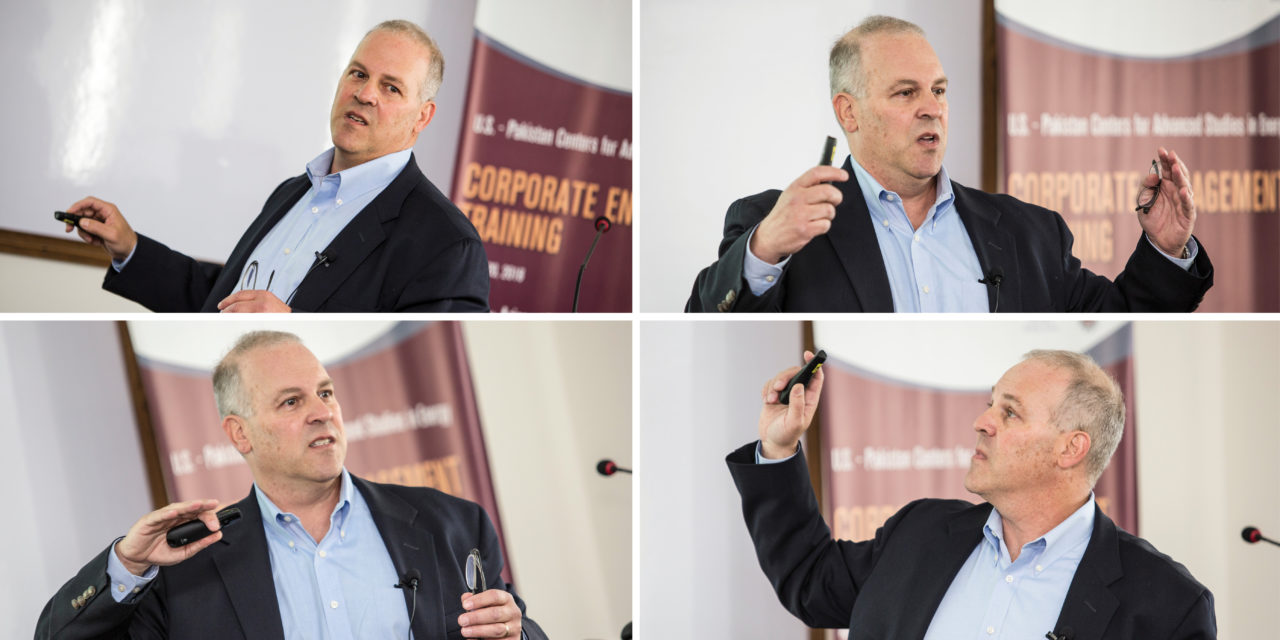Event recap: Learning the ins and outs of corporate engagement

Learning to engage corporate partners and secure funding from industry sources is key to the sustainability of any university research program.
[et_pb_section bb_built=”1″ admin_label=”section”][et_pb_row admin_label=”row” background_position=”top_left” background_repeat=”repeat” background_size=”initial”][et_pb_column type=”2_3″][et_pb_text admin_label=”Text” background_position=”top_left” background_repeat=”repeat” background_size=”initial” _builder_version=”3.0.51″ background_layout=”light” text_orientation=”left” border_style=”solid”]
Learning to engage corporate partners and secure funding from industry sources is key to the sustainability of any university research program. Faculty and staff from the U.S.-Pakistan Centers for Advanced Studies in Energy (USPCASE) participated in a corporate engagement training workshop facilitated by Mr. Lou Farina. Mr. Farina, a renowned expert on industry engagement, covered important topics including cultural and organizational differences between academia and industry, U.S. university corporate engagement structures, and an overview of tools for mapping and measuring corporate relationships. Guest speakers from Lahore University of Management Sciences (LUMS) and Sukkur Institute of Business Administration University introduced the participants to methods and resources being utilized in their respective universities to create and sustain mutually beneficial relationships with local corporations.
The session started with opening remarks from representatives of National University of Sciences and Technology (NUST), University of Engineering and Technology (UET) Peshawar and Arizona State University (ASU). This was followed by an introduction to the corporate engagement training and an overview of the objectives. Mr. Farina kicked off the training with an engaging exercise in which participants worked together to explain their views of the existing corporate engagement mechanisms within their institutions. The participants divided into four groups to present their understanding of corporate engagement and explain the departments and organizations currently leading this effort. From this starting point, Mr. Farina delved into the explanation of apparent differences between corporations and academia. He discussed parameters like organizational structure, means of connectivity, job mobility and writing styles in order to clarify the incentives for the two parties and how academia can modify its approach to better engage corporations.
Dr. Atif Saeed, the guest speaker from LUMS, introduced the methods and resources being utilized at his institution to create and sustain mutually beneficial relationships with corporations. He highlighted that engaging business leaders in order to create a comprehensive executive network is essential to maintain a fruitful relationship with students, professionals and academics.
Taking a holistic approach to corporate engagement centers
In the second session, Mr. Farina introduced a holistic approach for efficient corporate engagement centers. He explained that this approach is demand driven, where the corporations can be seen as customers who demand a much more integrated relationship between the different departments of two parties. Towards the end of the day, Mr. Farina stressed the importance of analytical capabilities and discussed the use of the radar chart—a chart that displays three or more variables on the same chart—as a vital tool for measuring the quality of a corporate-academic relationship.
The second day of the corporate engagement training kicked off with a discussion of organizational models of corporate engagement centers, moderated by Mr. Farina. This was followed by presentations from the participants on data pertaining to the current state of industry-academic relations at both NUST and UET Peshawar. This activity clearly outlined the existing industry relationships and helped participants identify gaps that can be used as a basis for further improvement. Mr. Ishfaq Lashari, the guest speaker from Sukkur Institute of Business Administration University, showed how successful collaborations were forged with multiple corporate partners using limited resources. He also highlighted the unique services that his institution is able to offer.
Tools and best practices
Mr. Farina then delved deeper into the organizational structures prevalent at U.S. universities like ASU, Michigan State University and Massachusetts Institute of Technology. He shared the mechanisms of technology transfer and discussed three distinct models of running industry collaboration programs at a university. Participants learned about the business development funnel and the importance of utilizing comprehensive data to sustain long-term collaborations. Participants also discussed the use of LinkedIn as a means of finding corporate engagement access points and the capabilities of the Alumni tool were explored. In the second session, Mr. Farina presented an overview of customer relationship management (CRM) software and the potential of CRM to streamline corporate engagement efforts. The training concluded with an engaging question and answer session.
[/et_pb_text][et_pb_counters admin_label=”Fancy Horizontal Divider (Bar Counter)” background_layout=”light” background_color=”#ffffff” bar_bg_color=”#8c1d40″ use_percentages=”off” border_radius=”0″ use_border_color=”off” border_color=”#ffffff” border_style=”solid” saved_tabs=”all” global_module=”1996″]
[et_pb_counter percent=”100%” custom_css_counter_container=”max-height:3px;”][/et_pb_counter]
[/et_pb_counters][et_pb_gallery admin_label=”Gallery” _builder_version=”3.0.51″ show_title_and_caption=”off” show_pagination=”on” gallery_ids=”2149,2146,2147,2148,2150,2151,2152,2153″ fullwidth=”on” orientation=”landscape” zoom_icon_color=”#00a3e0″ hover_overlay_color=”rgba(255,255,255,0.9)” background_layout=”light” border_style=”solid” auto=”off” /][/et_pb_column][et_pb_column type=”1_3″][et_pb_text admin_label=”Text” _builder_version=”3.0.51″ /][et_pb_testimonial admin_label=”Farah Testimonial” _builder_version=”3.0.51″ author=”Farah Batool” company_name=”NUST” url_new_window=”off” quote_icon=”on” use_background_color=”on” quote_icon_background_color=”#f5f5f5″ background_layout=”light” text_orientation=”left” border_style=”solid”]
“It was a very informative and interactive training.”
[/et_pb_testimonial][et_pb_testimonial admin_label=”Zohaib Testimonial” _builder_version=”3.0.51″ author=”Dr. Zohaib” company_name=”UET Peshawar” url_new_window=”off” quote_icon=”on” use_background_color=”on” quote_icon_background_color=”#f5f5f5″ background_layout=”light” text_orientation=”left” border_style=”solid”]
“It was a good capacity building opportunity. I got new insights of corporate engagement at the international level and how to implement it in Pakistan.”
[/et_pb_testimonial][et_pb_testimonial admin_label=”Sana Testimonial” _builder_version=”3.0.51″ author=”Muniba Sana” company_name=”NUST” url_new_window=”off” quote_icon=”on” use_background_color=”on” quote_icon_background_color=”#f5f5f5″ background_layout=”light” text_orientation=”left” border_style=”solid”]
“It was an amazing experience! The trainer is very knowledgeable on this subject and he made the training very informative and interesting.”
[/et_pb_testimonial][/et_pb_column][/et_pb_row][/et_pb_section]